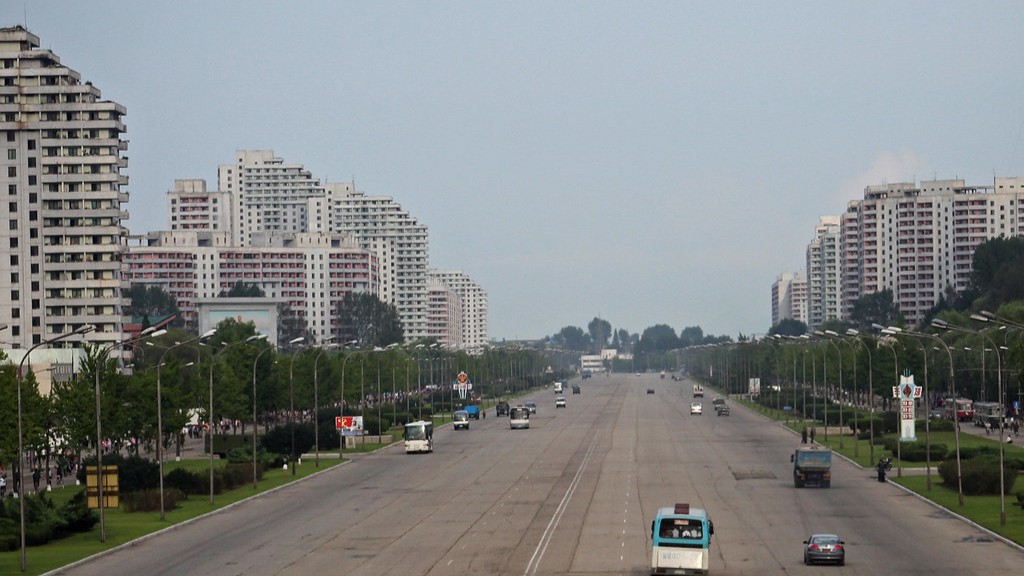North Korean Defences
North Korea is one of the most heavily-armed nations in the world. It has a military composed of numerous trained troops and an advanced arsenal of weapons. According to experts, the country has an estimated 1.2 million active troops and between 5,000 and 7,000 tanks. Furthermore, it is believed to have up to 13,000 pieces of artillery, 780 combat aircrafts and 5,025 multiple-rocket-launchers. North Korea also maintains a strong air defense network based on MiG fighter jets, surface-to-air missiles, and radar.
In addition to its physical defenses, North Korea also maintains an effective cyber defense infrastructure that includes an application for monitoring the flow of information, a system for monitoring foreign internet access, and an army of around 6,000 dedicated hackers. This network is complemented by a sophisticated command, control, and communications system, allowing North Korea’s forces to coordinate seamlessly.
Success Factors for an Invasion
For any potential invasion of North Korea, a successful strategy would rely on a combination of different factors. First and foremost, troops on the ground would need to be well-prepared with a comprehensive understanding of the geography of the country, as well as a strong knowledge of the tactics and strategies that would be most effective. Additionally, troops would need to be well-equipped with the latest weapons, vehicles, and military technologies.
Invading forces would also need to plan out the type of operation they will conduct. This should involve careful consideration of the various military objectives that must be achieved and the costs and benefits associated with each course of action. Finally, the troops should have a thorough understanding of North Korea’s military capabilities and tactics so as to neutralize them as quickly and effectively as possible.
In order to achieve success, troops would need to have access to a great amount of intelligence, both from the air and from special forces, in order to gain the tactical advantage. Furthermore, a successful invasion will require a great degree of coordination between forces, both to make sure that troops are in the right place at the right time, as well as to ensure that no strategically important targets are missed.
The Role of Diplomacy
Diplomacy is a vital factor that should not be overlooked when assessing the prospects of a potential invasion of North Korea. It is essential that any invading forces seek to avoid unintentionally provoking the isolated country and triggering an escalation of tensions between the two sides. It is therefore important to ensure that any military mission is carefully planned and coordinated, and that the appropriate diplomatic channels are used to ensure that any objectives that must be achieved during the invasion are properly communicated and understood.
Ultimately, a successful invasion of North Korea must be preceded by the implementation of a well-thought-out and comprehensive diplomatic strategy that takes into account the wishes and interests of the North Korean government and people. In this way, any potential invasion of North Korea can be conducted not as an act of aggression, but as an effort to resolve the current tensions between the two sides peacefully and to establish a more cooperative and lasting relationship.
The Potential Impact on the Region
An invasion of North Korea is bound to have long-term economic, political, and social ramifications in the region. Economically, the impact could be catastrophic, as the disruption of infrastructure and disruption of trade could send shockwaves across the entire area. Politically, the region could be propelled into a new era of uncertainty, as the North Korean state falls apart and the new government comes to power.
Socially, the disruption caused by the invasion would be immense. North Korea is a highly isolated state, and its people have been cut off from the outside world for decades. Consequently, the impact on the population would be immense, as millions of people are suddenly confronted with an unfamiliar and uncertain future.
Finally, the security dynamics in the region would be completely altered, as the balance of power between North Korea and its neighbors changes. This could result in conflict and chaos, as the various forces vying for power attempt to fill the vacuum left by the collapse of the North Korean state.
Possible Outcomes of an Invasion
The possible outcomes of an invasion of North Korea are highly unpredictable. On one hand, it may lead to the overthrow of the North Korean government, freeing the country’s people from its oppressive grip and paving the way for democracy and improved human rights. On the other, it may trigger an all-out war, with catastrophic losses of life on both sides.
Moreover, the presence of international forces in the region may lead to increased tensions between the U.S. and other countries. Meanwhile, the fate of North Korea’s nuclear weapons remains a mystery and will have to be dealt with before any lasting peace is realized.
Overall, it is impossible to definitively know what the outcome of an invasion of North Korea would be. What is certain, however, is that it would have a profound and far-reaching impact on the region and beyond.
Implications for the International Community
An invasion of North Korea would also have important implications for the international community. Any such move would require strong support from the United Nations and regional powers, as well as the cooperation of other countries who are reluctant to see a regional conflict erupt. Additionally, the U.S. and its allies would be obliged to provide extensive economic and humanitarian aid to the country, something that is likely to be hugely expensive and time-consuming.
Furthermore, depending on the situation, the international community may be called upon to serve as impartial mediators in the conflict, in order to ensure that the conflict does not deteriorate into a full-fledged war. Ultimately, the international community must be mindful of its responsibility to maintain peace and stability in the region, and any military action must be carefully considered and weighed against the potential consequences.
The Role of China
China is likely to play a critical role in any potential invasion of North Korea. Beijing is North Korea’s historical ally, and the Chinese government continues to provide the rogue state with economic and diplomatic support. Furthermore, China has the power to put pressure on North Korea, such as through trade restrictions, in order to prevent them from making any rash decisions.
At the same time, however, China is also wary of the prospect of an armed conflict in the region, as this could lead to regional unrest and the spread of instability. Consequently, China is likely to be an important force in any decision regarding a potential invasion of North Korea, as Beijing will want to ensure that any action taken is done with the utmost care and restraint.
The Human Cost of Invasion
The final factor to consider in any potential invasion of North Korea is the human cost that would be incurred. An invasion would likely lead to enormous disruptions in the supply of food, water, and other essential commodities to the population, leading to immense suffering and even death for those caught in the crossfire.
Furthermore, the psychological impact of war on the civilian population would be immense, as millions of North Koreans would face the stress of being displaced and the fear of aerial bombardment and other war crimes. Finally, the cost of reconstruction after the conflict would likely be huge as North Korea’s infrastructure would have been severely damaged due to the fighting.
The Way Forward
Given the unpredictable nature of an invasion of North Korea and the immense human and economic costs that would be incurred, it is clear that such a move should be taken only as a last resort. All diplomatic and economic means must be exhausted before any military action is undertaken. If a potential invasion does go ahead, then measures should be put in place to mitigate the potential effect on the civilian population and to ensure that any humanitarian assistance is provided in a timely manner.
Ultimately, the involvement of the international community is essential in finding a lasting solution to the Korean crisis. Working together with regional actors such as China and Japan, the global community must strive to bring the two sides together and to ensure that any lasting peace is achieved.





